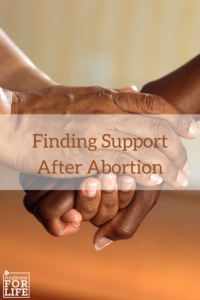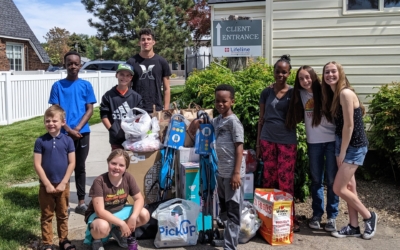Editor’s note: As co-sponsor of the Silent No More Awareness Campaign, Anglicans for Life recognizes the importance of helping women [and men] heal after the loss of a child from abortion. Did you know, 99% of the abortion aftercare programs are Christian-based and share the Gospel during the course of the class? Therefore, we are delighted to share this blog recently written by our friends at Support After Abortion. It highlights the value of churches posting information about abortion after-care programs in your bulletin announcements. Here’s one you can use: “If someone you know is hurting from a past abortion experience (women and men) visit SupportAfterAbortion.com to learn about the loving help that is available.”
Although Support After Abortion became a 501c3 in April 2020, the dream of a comprehensive network to serve the men and women impacted by abortion began some 7 years ago. The CEO of Support After Abortion, Lisa Rowe, and President of the Board of Directors, Janine Marrone, discuss how the consumer research has guided the steps of Support After Abortion.
After surveying the abortion healing movement, Support After Abortion was unable to find any scientifically-driven consumer research on the impact of abortion. Through the leadership of Janine Marrone, two surveys were conducted to understand the 18+ women demographic across the nation. The insights gleaned from this scientifically-driven research have been one of the most requested presentations from leaders worldwide.
9 out of 10 Don’t Know Where To Go For Abortion Healing
Janine Marrone shares, “Over 3000 women were surveyed that had experienced abortion, and 9 out of 10 reported they did not know where to go for healing.” This information is very eye-opening. The fact that 90% of women don’t know where to go for healing sets the foundation for the work we do at SAA. In fact, the name “Support After Abortion” was every bit intentional. The title of our organization makes our mission very clear. From this research, we have learned the need for our industry to better market and advertise abortion healing. Often the titles of resources, programs, or even ministries don’t communicate that they are providing abortion healing services. While the word abortion has often been taboo, it is a growing issue that needs to be humanized and needs to be discussed. It’s time we use the word abortion boldly instead of whispering it in shame. When we speak it aloud and put it in print, we can direct those impacted on where to go for healing. Janine shares, “Just recently, one diocese shared with us that they renamed all their programs to fall under the heading of Abortion Healing Ministry.” What a proactive step in the right direction!

83% Want Anonymity in Abortion Healing
The research also revealed that over 83% of women valued anonymity. If women prefer to remain anonymous, as service providers, we might need to rethink the settings in which we offer support. Conducting an in-person group in a pregnancy center may not be preferred for the vast majority of individuals. A virtual group setting where women can join from all corners of the world might be more preferred. The research also concluded that 2/3 of women prefer a non-faith-based approach to healing. While the women surveyed did identify with a religion, 80% of them reported rarely to never attending church services. This information shows us that while most women may identify with a faith, they are not currently sitting in the church pews, and they don’t prefer a program that centers around the gospel. Many of the verbatim comments from the surveys attributed this to fear of judgment or self-condemnation. As service providers, we must have access to non-faith-based resources to meet women where they are and give them what they need, packaged in the way they want it. While we may be of faith and believe in that methodology for healing, we need to serve and trust that God leads their healing regardless of the approach.
SAA Plans for 2021
In the midst of Covid-19, Support After Abortion has made enormous gains. Support After Abortion has organized and held 2 virtual conferences, connecting with 8,000 leaders. We also connected with 2,000 clients via our HOPE line, virtual groups, and programming. We directly impacted 10,000 individuals. The abortion healing industry is hungry for a catalyst for hope and healing, and we are honored to step up to the plate.
In 2021, the goals of Support After Abortion will be founded on the three pillars of Compassion, Collaboration, and Capacity.
Compassion
Support After Abortion will continue to humanize abortion by sharing personal testimonies highlighting the need for healing via our Facebook Lives and blog posts. Consumer research will be conducted with specific regard to men. The industry is very eager to receive answers to many unknown questions about how they are impacted by abortion and how to serve them and their needs.
Collaboration
Support After Abortion will continue to foster collaboration within the segmented industry of abortion healing. The collaboration will be facilitated in many ways, including working with the one place where women are least likely to go for healing—the church. Presently, programs are being created for the clergy that center around language-use. With the volume of clergy coming to Support After Abortion and wanting to collaborate to reach their parishioners, Support After Abortion envisions setting up task forces to create and enact programs. More virtual conferences will be held, Support After Abortion staff will be available for speaking events, and will continue its presence at events like March for Life, Heartbeat, and Carenet. Support After Abortion looks forward to continuing their work with pregnancy centers and Brightcourse to provide programs for clients. As Janine so eloquently states, “We are the hands and feet of Christ. The hand can’t do what the foot can. There is no one-size-fits-all.” We have to work together. When we work together, we build each person’s capacity to serve.
Capacity
Finally, concerning capacity, Support After Abortion aims to grow leaders. When one person is grown and strengthened, their capacity to serve is also grown. Lisa shares the power of multiplication with the illustration of just what can happen with the leaders reached at the two virtual conferences this year. “If each of the 8,000 leaders we reached touches just 10 people, the number of people impacted becomes 80,000.” In the words of Helen Keller, “Alone we can do so little, together we can do so much.” The capacity for what the industry can do together through a catalyst like Support After Abortion truly knows no bounds.
Conclusion
Before the Support After Abortion virtual conferences and before the collaboration with other abortion healing ministries, Support After Abortion served just 12 individuals locally. While this number is slightly larger than the average of 10 individuals served each year through an abortion healing program, it still reflects the industry-wide struggle to increase capacity to serve those in need of healing. Support After Abortion is pleased to report that after two virtual conferences and collaboration with some of the industry’s brightest, we have connected some 2,000 individuals with hope and healing. 2,000 individuals in less than a year compared to the average of 10 is monumental. With a continued focus on compassion, collaboration, and capacity, Support After Abortion is sure to make great gains in its mission to end the demand for abortion by healing those impacted by abortion.



